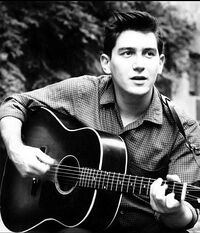Phil Ochs
Relevance
Image used as a concert backdrop during "Days Of Decision" in 2019.
Mentioned In
- Boxers Tour 1995 Pre-show Tracks
- Outside/Southpaw Grammar Tour 1995 Pre-show Tracks
- California Son
- SOFTLY, AS I LEAVE YOU. - Morrissey Central (November 5, 2019)
Writer
Discogs Information
Profile
Born - December 19, 1940 in El Paso, Texas. Died - April 9, 1976 in Far Rockaway, NY (suicide)
American folk singer/songwriter who was active throughout the 60s and 70s, but committed suicide by hanging himself at his sister's home on April 9th, 1976. Brother of Michael Ochs.
External Links
- https://www.discogs.com/artist/536656-Phil-Ochs
- http://en.wikipedia.org/wiki/Phil_Ochs
- http://sonnyochs.com/philbio.html
Wikipedia Information
 |
Philip David Ochs (; December 19, 1940 – April 9, 1976) was an American songwriter and protest singer (or, as he preferred, a topical singer). Ochs was known for his sharp wit, sardonic humor, political activism, often alliterative lyrics, and distinctive voice. He wrote hundreds of songs from the 1960s to early 1970s and released eight albums. Ochs performed at many political events during the 1960s counterculture era, including anti-Vietnam War and civil rights rallies, student events, and organized labor events over the course of his career, in addition to many concert appearances at such venues as New York City's Town Hall and Carnegie Hall. Politically, Ochs described himself as a "left social democrat" who became an "early revolutionary" after the protests at the 1968 Democratic National Convention in Chicago led to a police riot, which had a profound effect on his state of mind. After years of prolific writing in the 1960s, Ochs's mental stability declined in the 1970s. He had a number of mental health problems, including depression, bipolar disorder and alcoholism, and died by suicide in 1976. Ochs's influences included Woody Guthrie, Pete Seeger, Buddy Holly, Elvis Presley, Bob Gibson, Faron Young, and Merle Haggard. His best-known songs include "I Ain't Marching Anymore", "When I'm Gone", "Changes", "Crucifixion", "Draft Dodger Rag", "Love Me, I'm a Liberal", "Outside of a Small Circle of Friends", "Power and the Glory", "There but for Fortune", "The War Is Over", and "No More Songs".


